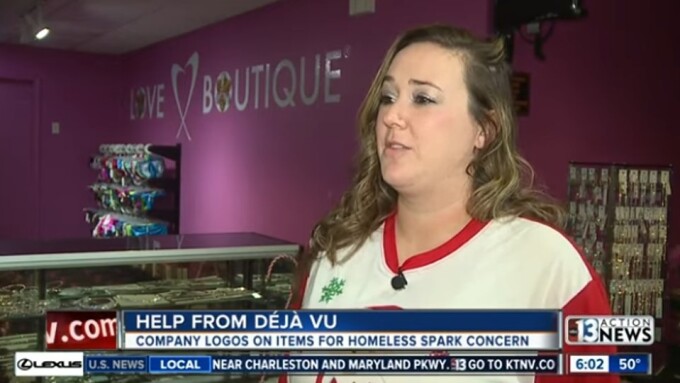LAS VEGAS — A complaint from a local mother over Deja Vu-branded tents being used by homeless people near downtown Las Vegas is drawing international media attention for the erotic entertainment chain.
According to KTNV, a viewer reached out to report that while driving through Las Vegas’ downtown area with her small children, she was shocked to see the tents provided by the “immoral” and “disgusting” company.
Deja Vu General Manager Megan Swartz told XBIZ that Action News 13 approached the company for an interview over a complaint.
“We weren’t even sure if it would actually air,” she said. “Once we saw the traction picking up on social media, we knew at that point it would definitely continue to grow.”
In the company’s statement, Déjà vu addressed its donations to the homeless, noting a recent ordinance passed by the city of Las Vegas that will make it illegal to camp or sleep sidewalks.
“While some seem to think that the solution is a camping ban, we think that the solution is one that includes decency and kindness,” the company said in its statement. “We hope that others can show some humanity and do their share to take care of the most needy among us.”
Making headlines nationwide and abroad, Swartz says that the controversy is gaining supporters for Deja Vu.
“I think all the media attention is great attention for the cause,” she said. “If you take the time to read the comments on the various social media posts, nearly everyone stands in our corner on this. Had we known it was going to make the news, I would not have worked in elf pajamas on Christmas Eve! Kind of embarrassing! We have had numerous people email us through our website, commending us and offering to partner up to do more for the homeless population. We have even had people as far away as Sweden and England reach out saying they saw us on their local news and were very proud to see what we have done.”
Donating annually to causes such as American Cancer Society, homeless shelters, food banks and more, Deja Vu has a long history of charitable giving — however, it’s not the first time that the company’s generosity has been rejected, as detailed in this recent op-ed.








